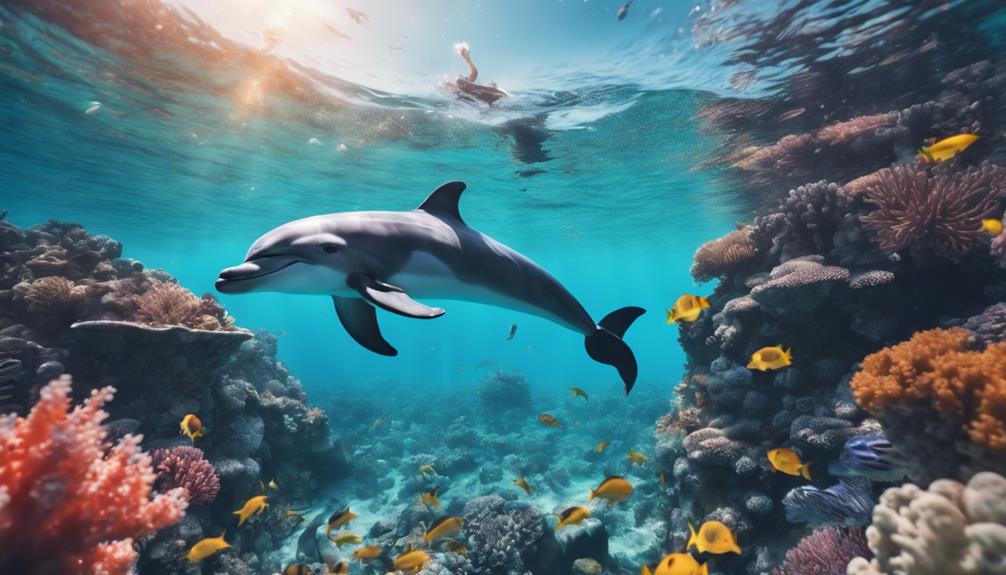You can’t have a pet dolphin because of the challenges, restrictions, ethical concerns, and high costs associated with ownership. Due to their intelligence, social nature, and legal protections, keeping dolphins as pets is not feasible. The complexities of caring for a dolphin extend beyond simple companionship and require careful consideration. If you’d like to explore the detailed reasons behind this, more information is available in the research provided.
Ownership Challenges and Legal Restrictions
Owning a pet dolphin poses significant challenges and legal restrictions due to their high intelligence, strong family ties, and the ethical concerns surrounding capturing and keeping these marine mammals. Dolphins are highly intelligent creatures that form deep family bonds, making it difficult to provide them with the social interactions they need in a domestic setting. Additionally, the capture and captivity of dolphins raise ethical dilemmas, as these animals are often taken from the wild, disrupting their natural habitats and social structures.
From a legal perspective, while there are no direct laws against owning dolphins, regulations protecting wild dolphin populations hinder ownership. Buying and selling dolphins is illegal in many regions, complicating the process of acquiring a pet dolphin. The substantial investment required regarding space, financial resources, and ongoing maintenance costs further adds to the challenges of owning a dolphin.
Domestication Feasibility and Training Considerations
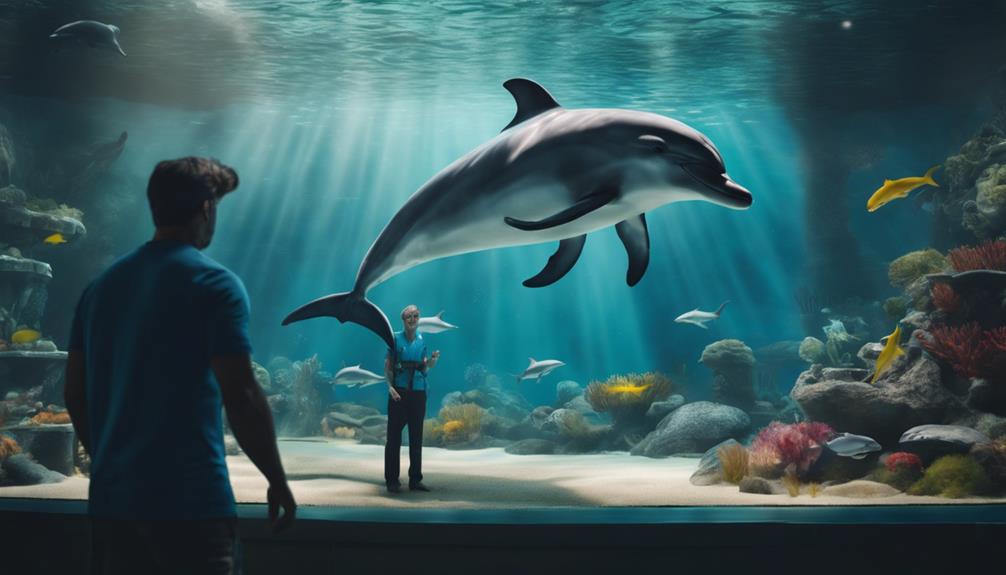
Considering the challenges and legal restrictions of owning a pet dolphin, understanding the feasibility of domestication and the implications of training becomes imperative. Domestication of dolphins isn’t a viable option due to their lack of breeding over centuries for such purposes.
Dolphins in captivity are trained rather than domesticated, which can lead to challenges like aggression stemming from their size and high maintenance needs. It’s essential to recognize that the high costs associated with maintaining a pet dolphin, including substantial daily food requirements, can be overwhelming.
While captive dolphins offer better accessibility for human interaction and research assistance, they also face issues such as separation from their families, limited space, distress, and susceptibility to diseases in an unfamiliar environment. Ultimately, the decision to keep a pet dolphin raises ethical concerns about their well-being, welfare, and conservation efforts, necessitating careful consideration before undertaking such a venture.
Captive Dolphins: Advantages and Disadvantages
The captivity of dolphins presents both benefits and drawbacks that warrant careful evaluation.
On one hand, captive dolphins offer better accessibility for human interaction, allowing researchers to study and learn more about these magnificent creatures up close. This proximity can lead to advancements in marine science and conservation efforts.
However, there are significant challenges associated with keeping dolphins in captivity. These challenges include the separation from their families, limited living space, potential distress from an unfamiliar environment, and increased susceptibility to diseases.
Ethical concerns also arise regarding the well-being, welfare, and conservation of dolphins in captivity. It’s essential to weigh the advantages of closer human-dolphin interaction against the negative impact on the dolphins’ physical and emotional health.
Ultimately, the decision to keep dolphins in captivity should consider the complex balance between scientific advancement and the ethical treatment of these highly intelligent marine mammals.
Financial Costs and Investment Required
Captive dolphins involve significant financial costs and investment requirements due to various factors that must be carefully considered before pursuing ownership. The initial cost of acquiring a dolphin ranges from $50,000 to over $200,000, depending on factors like age, species, and training level.
Annual maintenance expenses can escalate up to $300,000, covering food, veterinary care, habitat upkeep, and staff salaries for proper care. Besides the purchase and upkeep costs, building and maintaining a suitable marine enclosure or pool can add substantial expenses to the total investment.
Additionally, training and enrichment programs are vital to guarantee the well-being and mental stimulation of the dolphin, further increasing financial commitments. It’s important to acknowledge these significant financial burdens before deciding to have a pet dolphin, as overlooking these costs can lead to inadequate care and potential welfare issues for the dolphin.
Ethical Concerns and Welfare Issues
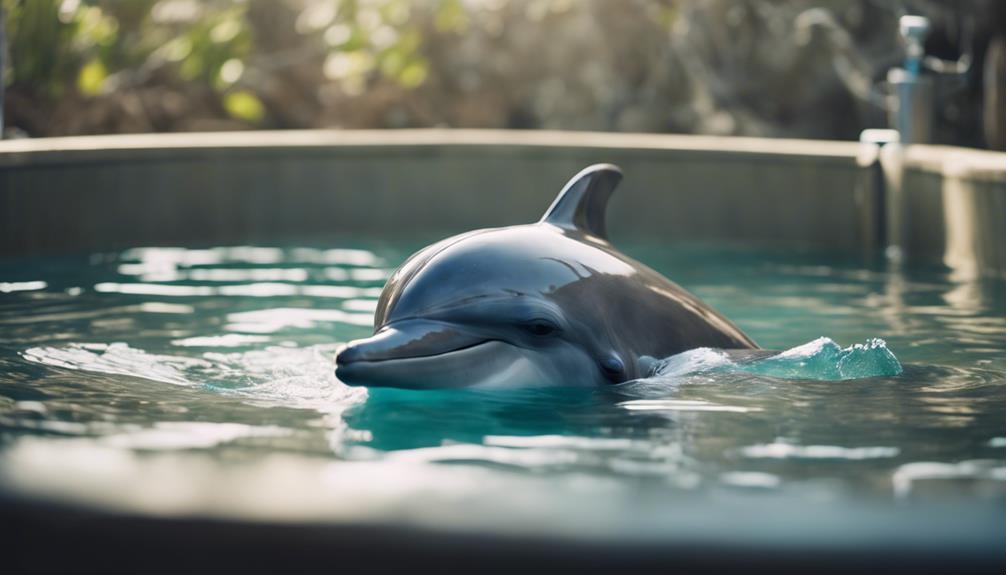
When contemplating ownership of a pet dolphin, ethical concerns and welfare issues must be carefully considered. Dolphins are highly intelligent and social creatures that form strong family bonds, making captivity a significant ethical dilemma. The welfare of dolphins in captivity is a prominent concern, as they may suffer from stress, behavioral issues, and health problems due to confinement in artificial environments. Their complex physical and psychological needs are challenging to meet in captivity, raising questions about the morality of keeping them as pets.
Furthermore, the capture and trade of dolphins for ownership raise serious ethical issues regarding animal rights and conservation efforts. Dolphins are often taken from the wild, disrupting natural populations and ecosystems. This practice not only harms individual dolphins but also contributes to the decline of wild dolphin populations. By owning a pet dolphin, you’d be supporting an industry that disregards the well-being and conservation of these magnificent marine mammals.
Ultimately, the ethical implications of owning a pet dolphin extend beyond personal enjoyment to encompass broader considerations of animal welfare and environmental conservation.
Environmental Impact and Conservation Efforts
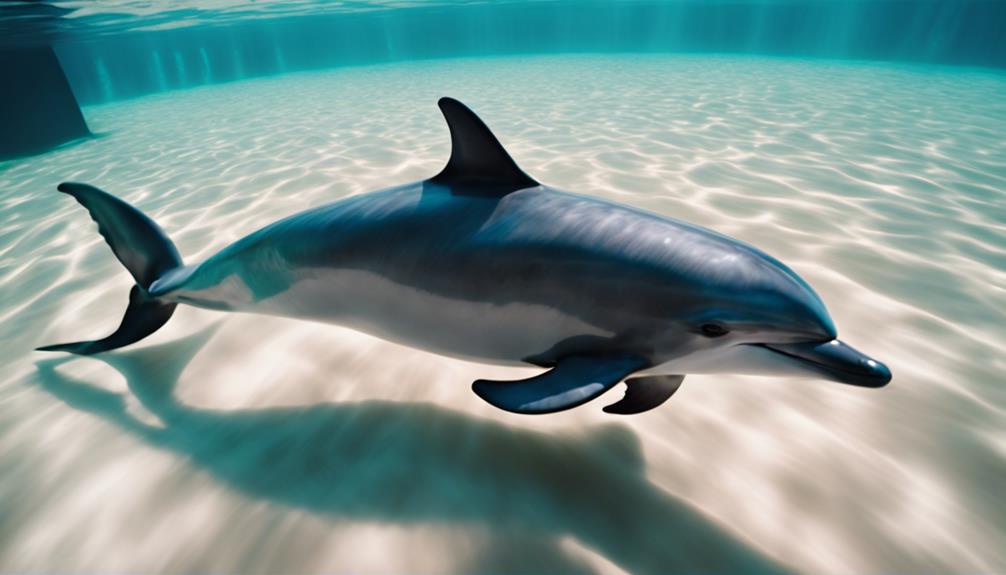
Considering the implications of owning a pet dolphin, it’s imperative to understand the significant environmental impact and the critical role conservation efforts play in preserving marine ecosystems. Keeping a dolphin as a pet can have detrimental effects on the environment and marine ecosystems. Dolphins are highly intelligent creatures that play an essential role in the balance of marine life. Capturing dolphins for captivity disrupts their natural habitats, leading to a decrease in wild populations and an imbalance in the ecosystem.
Conservation efforts are essential to protect dolphins and their habitats. Organizations work tirelessly to guarantee the conservation of marine ecosystems, advocating for the protection of dolphins and their natural environments. These efforts focus on creating marine protected areas, implementing sustainable fishing practices, and raising awareness about the importance of preserving marine life. By supporting conservation initiatives, you can contribute to the well-being of dolphins and help maintain the health of our oceans for future generations. Remember, every action counts in safeguarding the environment for these magnificent creatures.
Expert Insights on Dolphin Ownership
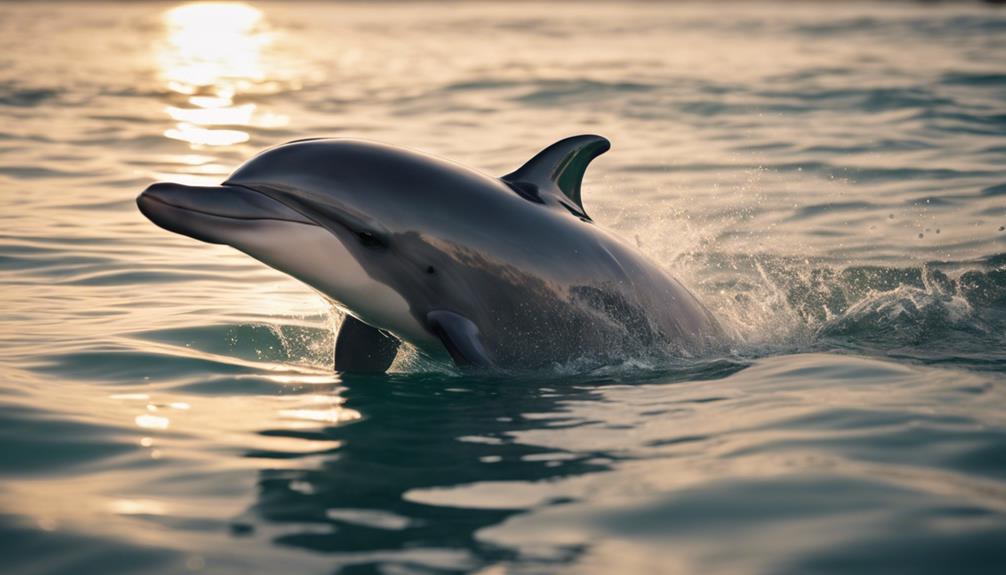
If you’re contemplating the idea of having a pet dolphin, it’s important to consider the expert perspectives provided by wildlife specialists. Owning a pet dolphin presents significant challenges due to their intelligence, strong family bonds, and the ethical concerns surrounding captivity.
Wildlife experts Henry Sinclair and Sarah Kirby highlight the complexities involved in dolphin ownership, emphasizing the substantial investment required regarding space, financial resources, and maintenance costs. While there are no direct laws against dolphin ownership, legal restrictions protecting wild dolphins often make buying and selling them illegal.
Furthermore, the domestication of dolphins isn’t feasible as they haven’t been bred over centuries for such purposes. Captive dolphins are trained, not domesticated, and may exhibit aggression due to their size and high maintenance requirements. The high costs associated with daily feeding, specialized care, and habitat maintenance further underscore the challenges of keeping a pet dolphin.
Before considering dolphin ownership, it’s important to weigh these expert insights and carefully evaluate the responsibilities and ethical considerations involved.
Making an Informed Decision
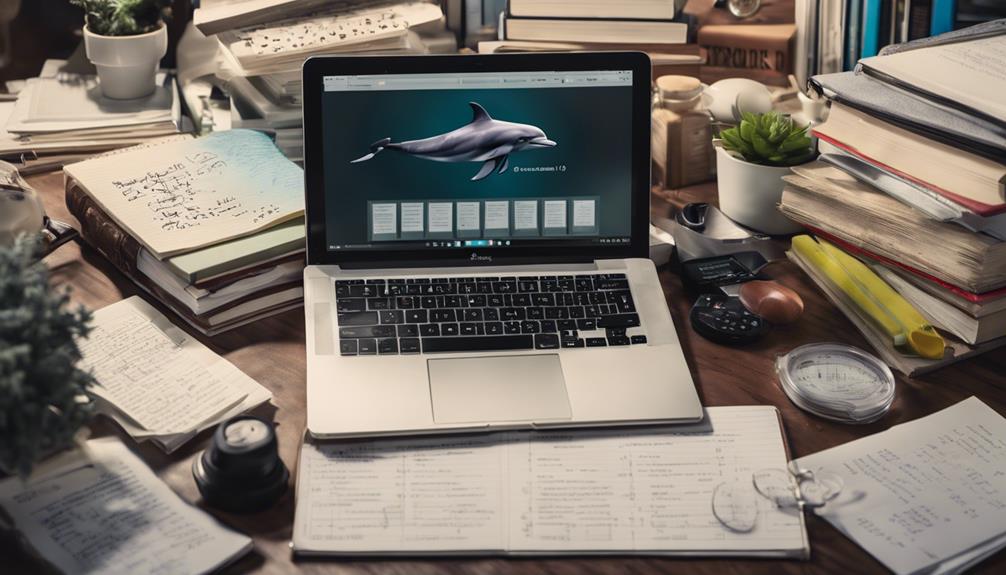
To make an informed decision about owning a pet dolphin, carefully assess the ethical, financial, and environmental implications involved.
Ethically, consider the complexities of owning a highly intelligent animal with strong family bonds, as well as the concerns surrounding capturing and keeping dolphins.
Financially, understand the substantial investment required regarding space, resources, and ongoing maintenance costs. The cost of ownership can range from $50,000 to over $200,000, with annual maintenance expenses around $300,000. Additionally, legally, while there are no direct laws against dolphin ownership, regulations protecting wild dolphins often make buying and selling them illegal.
Environmental considerations are equally important, as owning a dolphin can impact wild populations and ecosystems. Depletion of wild dolphin populations, ecosystem disruptions, and conservation efforts in their natural habitat are all significant factors to ponder.

Erzsebet Frey (Eli Frey) is an ecologist and online entrepreneur with a Master of Science in Ecology from the University of Belgrade. Originally from Serbia, she has lived in Sri Lanka since 2017. Eli has worked internationally in countries like Oman, Brazil, Germany, and Sri Lanka. In 2018, she expanded into SEO and blogging, completing courses from UC Davis and Edinburgh. Eli has founded multiple websites focused on biology, ecology, environmental science, sustainable and simple living, and outdoor activities. She enjoys creating nature and simple living videos on YouTube and participates in speleology, diving, and hiking.

